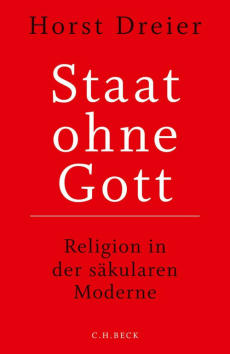“State Without God”
Book by legal scholar Horst Dreier on religion in secular modernity

The renowned legal philosopher and former Hans Blumenberg Visiting Professor Prof. Dr. Horst Dreier has published a monograph on religion in secular modernity under the title “Staat ohne Gott” (State Without God). The first four chapters of the volume cover the topics of his lecture series “Herausforderungen des sekulären Verfassungsstaates” (Challenges of the secular constitutional state), which was part of the Hans Blumenberg Visiting Professorship at the Cluster of Excellence “Religion and Politics” in the winter semester 2016/17. Horst Dreier writes in the book’s forward that the discussions with members of the Cluster of Excellence were of great importance for the written elaboration of the lecture texts.
The author argues in his book that in modern democracy, the state must not identify with any particular religion, even if this were Christianity. Only in a state without God could all citizens live in freedom according to their quite different religious or other convictions. “State without God, therefore, neither means world without God nor society without God, and certainly not man without God. Rather, it means that the democracy of the Basic Law is completely incompatible with every form of a theocratic state, theocracy, a sacred order or a Christian state,” according to Horst Dreier.
The development of Germany towards a multi-religious and multicultural society has, according to the legal scholar, created new areas of conflict between supporters of different faiths and between them and the authorities of the state. Particularly in view of the intensive debate about a clash of cultures and the challenge of free Western societies posed by Islam, however, it is necessary to get back to the basic structures and fundamental issues of the secular state, “to its programme, its profile, its problems”.
Lecture series at the Cluster of Excellence
In his lectures at the Cluster of Excellence, Horst Dreier examined the constitutional history of religious freedom in Germany. He discussed whether the religious ideological neutrality of the secular state was possible and asked whether the state could ignore its Christian roots and whether the liberal community depended on sacral elements. He began by focusing on the “contested term” of secularisation.
Horst Dreier, born in Hanover in 1954, is Professor for Legal Philosophy, Constitutional and Administrative Law at Würzburg University. From 2001 until 2007, he was a member of the National Ethics Council. The scholar received multiple awards and published numerous papers in his research areas, such as " Säkularisierung und Sakralität” (Secularisation and Sacrality; 2013). The Hans Blumenberg Visiting Professorship, named after the influential philosopher Hans Blumenberg (1920-1996), is to contribute to bringing innovative impulses from international research to Münster and consolidating the interdisciplinary compatibility at the Cluster of Excellence. The Cluster has 200 members from more than 20 disciplines of the humanities and social sciences. (C. H. Beck/sca/vvm)

